- Home
- Francine Mathews
Death in Rough Water Page 9
Death in Rough Water Read online
Page 9
“You were out on the water?”
He nodded. “Shoulda stayed out all night, in retrospect.”
He’d left the pier in the late afternoon with his eldest son, a kid of f ifteen who was just getting the passion for blues, and they’d come back late with their lights on.
“What time was that?”
“Geez, I dunno. Eight-thirty, nine, maybe? Just light enough to still see, and dark enough not to see much.”
“Did you notice anything wrong at the pier?”
“Not on our approach, no. But the explosion came when I was mooring up. Like an idiot, I tried to help, instead of heading right back out to sea.”
“You’re sure it was an explosion?”
“Couldn’t have been anything else, Detective. A loud boom, like a gas tank exploding, and a helluva sheet of f lame.”
“Where’d it come from?”
He turned and gestured vaguely toward the ruin of the pier. “From the other side of the dock, couple of boats down from mine. I didn’t get a clear view of what happened, but Charlie Roundseville”—at this, Marty looked past Merry’s shoulder in search of Charlie—“was having a party on his yacht, Calypso, only a few slips away. The explosion must have shaken more than the martinis.”
Charlie Roundseville was a tall, rangy-looking guy in his mid-thirties. He had a tailgate picnic set up on the back of his Range Rover and was offering wine to various passersby. Last night’s party, it seemed, had simply moved to the beach. Merry was wearing her police uniform, something that, as a detective, she rarely donned; but off icial authority went with it, she f igured, and authority was needed. Charlie Roundseville was hardly awed, however. He greeted her with an outstretched glass.
“Off icer! May I offer you a drink?”
“Too early, I’m afraid. You’re Charlie Roundseville?”
“The same. But you have the advantage of me, Miss—”
“—Detective Meredith Folger. I’m in charge of the police side of this investigation.”
“So there’s an investigation?” He glanced triumphantly at one of his guests. “I win the bet, Jamie. Arson.”
“What makes you so sure?” Merry asked.
“My own eyes, Detective. Sure you won’t have a glass?” He uncorked a bottle of California Pinot and sloshed it into what looked like a plastic champagne f lute. “Salvaged the picnic basket from the boat when all hell broke loose,” he conf ided. “These were in it.”
“Mr. Roundseville,” Merry said, “could we start from the beginning?”
“Certainly. It’s the end, after all, that’s so damn depressing. What do you want to know?”
Charlie Roundseville owned a house on Orange Street. He had made what Merry gathered was an obscene amount of money running a hedge fund, and now devoted himself to spending it on himself and his friends.
“You had a party on your boat last night?”
“Drinks and hors d’oeuvres. I’d intended a brilliant launch of the summer season, but losing my eighty-foot yacht was not part of the plan.”
“You were on board when the f ire started?”
“We’d intended to go on to dinner in town, but it was a great night, Detective, and nobody wanted to move. We bagged the reservation at Ventuno.”
“When did you realize something was wrong?”
“Nine o’clock or so.”
“Could you be more precise?”
“Jamie!” Charlie called. “What time was it when the f irst bomb or whatever blew? He always has his alarm set,” he conf ided to Merry in a wine-scented mutter, “so he can check messages. The damn phone beeps every f ive minutes.”
“Every f ifteen,” Jamie said indignantly.
“See? Ass. What time did the f ire start?”
“Right after eight-forty-f ive.”
“Some use, anyway,” Charlie said, turning back to Merry.
“So you think it was a bomb.”
“Sure of it.”
“Could you describe it for me, please?”
“Well—” He hesitated. “My slip is—was—number nine. The boat in seven—that’s just next to mine on the left as you’re facing the dock”—he waved toward the blackened skeleton of the pier—“was a pretty little antique sloop named the Sea Devil, belonged to a woman, Nancy Harding. It’s hard to picture now, of course. The explosion came from number f ive, just to the left of her. A huge boom! And then the sounds of falling debris and crackling f lame right after. We were sitting on deck, some of us, while the rest were in the cabin. The boat rocked and pitched like we’d been hit by a typhoon. I remember looking over my shoulder and seeing a wall of f lame jump from number f ive into Nancy’s sloop. The furled sails went up f irst, and then it was the mast, and the planking between the two slips was blazing. I jumped onto the dock and threw my wine at it. Stupid thing. Alcohol can’t have helped.”
“Probably not,” Merry said gently, “but it’s the sort of impulse we all have.”
“Exactly. Well, then some people got out of their boats and started throwing buckets of water on the f lames, but they seemed to simply get higher. Marty Bremen pulled out his cell and called 911. A few people f ired up their engines and tried to motor out to sea. The ones who left right away got lucky. The rest of us just tried to form a bucket brigade to douse the f ire, but—” Charlie stopped and took a sip of wine. “I don’t know this for certain, you understand, but I’ve been thinking about it ever since. We couldn’t put the f ire out. There was oil all over the place. Water was useless. And that’s what made me think of a bomb. Something like cigarette ash on gasoline wouldn’t have had the explosive power. Somebody rigged the dinghy and made sure the dock would burn, too.”
“Who owned the dinghy?”
“I’d never seen it before,” Charlie said. “Slip f ive is reserved by the mooring company for short-term rental. It’d been empty the day before.”
“Did you see who tied it up yesterday—or do you remember what time?”
He shook his head. “We didn’t come down until cocktail hour yesterday. It was moored then.”
“Could you describe it for me?”
He snorted in derision. “A vessel to sink rather than sail. A little wooden dinghy, maybe twelve feet, couple of decades old, with oars and a lot of old crap stowed in the bottom. Needed scraping and painting desperately. The sort of dinghy you see all the time, and never look at twice.”
And I’ll bet the skipper’s description matches, Merry thought: a nondescript guy in a faded polo and shorts, probably former military with explosives training. Or maybe just a guy who’d worked construction and knew how to blow things up. The sort of guy no one would notice, the sort of guy nobody did.
Chapter 10
Will Starbuck was out of breath from pedaling the four and a half miles between his door and Mason Farms. He would not have noticed the distance last year, but that he was able to ride the bike at all this Memorial Day weekend was cause for thankfulness. The previous fall, a murderous trap had knocked Will from his saddle, leaving him with a fractured skull and damaged coordination. This was his f irst trip to Peter’s under his own power in over six months.
He laid the bike in the tall grass by the drive and pounded up the back steps to the kitchen. Rebecca was ironing, and that particular smell of damp linen and moist metallic heat had crowded spring out of the room.
“Where are you going in such a hurry?” she exclaimed.
“Peter here?”
“He’s in the study.”
Will shot down the hallway before she could ask another question and paused long enough before Peter’s closed door to permit an impatient knock. Before the invitation to enter was half spoken he’d turned the knob.
“Will!” Peter was in his favorite armchair, a last mug of coffee to one side and his tanned face just lifting from a nursery c
atalogue. “Where’s the f ire?”
“So you know about it then,” he said, disappointed. “I thought I’d be the f irst to tell you.”
“There’s such a thing as the news,” Peter reminded him, “although rarely does it offer such spectacular footage of Nantucket.” He f lipped the catalogue closed, stood up, and stretched his hands over his head. “Matter of fact, I ran by South Beach this morning. Got up early, saw the pictures on TV, and thought of the boat Adelia Duarte rented. We used it only two days ago. I can’t believe it’s gone.”
Will felt himself f lush. Peter had an uncanny way of voicing the things he most wanted to discuss but lacked the courage to say. He met the older man’s eyes and looked down, feeling exposed and young.
“What is it?”
“I just wondered,” he said, “if maybe Rafe wouldn’t be f ishing anymore. I sort of miss seeing him around here.”
“It hasn’t been that long,” Peter said, momentarily amused. “Only a weekend.” Then he read the unhappiness in Will’s face and adopted a more sober expression. “I imagine you miss him around the Greengage,” he said. “I remember from my own parents. Three days of silence and tension can be a lifetime.”
“It’s just that it’s making my mom crazy,” Will burst out. “She’s moping around the house, ignoring everybody, and she’s not cooking right. People’s orders have been late all weekend. She’s mixing them up. The restaurant is really important to her, you know? Only now—it’s like it doesn’t matter. It’s a lousy way to start the season.” He kicked at a coffee table leg and slumped down on Peter’s sofa. “I keep thinking Rafe’ll come by, and she’ll snap out of it. Or that I should get him over to the house. But what if I screw things up?”
“You’re afraid you’ll make it worse.”
Will nodded. “Then it’ll be my fault. If I leave them alone, it’s their problem. But how can I leave them alone? It’s my wedding, too!”
“You’re right, of course. I hadn’t thought of it that way.”
“Pete,” he said imploringly, and then hesitated, his face f lushing. “Do you think you could . . .”
“Talk to them? But what if I screw things up?” Peter smiled. “Playing matchmaker isn’t my strong suit, Will. I’m better at nursing grudges. Besides, what could I do? Tess doesn’t want Rafe f ishing. She particularly doesn’t want him f ishing with Adelia Duarte. I’m afraid that kind of attempt to control Rafe only makes him resist her harder. If it comes up now—this clash of wills and lifestyles—it’s bound to come up later. Better they learn how to live with it before the wedding.”
“If there is a wedding,” Will said.
“Has your mother canceled any of the arrangements?”
He shook his head. “Nope. But maybe she just hasn’t thought of it yet. She isn’t very organized these days. She’s talking to herself like a total space. I’ll ask her a question, and she won’t even answer. It’s worse than when Dad died.” He paused. “Rafe’s made her really happy, I guess. I don’t want that to change. Things were pretty bad a year ago.”
“I know.”
“Where is Rafe, anyway?”
“He’s gone into town,” Peter said. “To see a guy named Jackie Alcantrara.”
“Who’s he?”
“The man who owns a boat Rafe’s thinking of renting.”
•
“Give me one reason to help Del out,” Jackie was saying. “What’s she ever done but shaft me?”
“So the Praia wasn’t lost in the f ire?”
Jackie shrugged and said nothing. He’d told Rafe he’d been working on the Lisboa Girl when the f ire started, and from his excellent position at the far end of the pier, had had no diff iculty in f leeing the harbor early. But Rafe didn’t know whether the Praia had been moored off South Beach or not.
“You don’t have to help Del out,” he said, starting over. “You can view it as money in your own pocket.”
“Or the lawyer’s.”
“You own the boat,” Rafe said patiently, “or will. Any rent the lawyer collects will be deposited in the estate. It’ll go to you eventually. It’s a way to make money when you’re just sitting at dock.”
“That Felix Harper guy won’t even let me take the Lisboa Girl out. What makes you think he’ll rent the Praia to Del?”
“I called him.”
“You did? Without asking me?”
“You own the boat, Jackie, not the lawyer.”
“Shit.” Jackie pulled a toothpick out of his mouth and stared venomously at the point. “Everybody’s trying to run my business. Felix. You know what that means? In Latin? Happy. I guess he’s pretty happy right now, all the money he stands to make before I get what’s my due.”
“He told me he’s planning to call you. Thinks there’s no reason why you can’t work the Lisboa Girl a similar way—pay rent to the estate and take her out to f ish.” Anticipating Jackie’s pique, Rafe had suggested the idea to Felix Harper. “Until Joe’s will is probated, that’s the only solution. So he’s not giving Del any special favors. He’s treating her the same as you.”
“Me, pay rent to work the Girl? Pay it to myself? What a bunch of crap. It’s killing me, da Silva. You know the blues they’re hauling in right now? The schools started early this year. I’m burning money every day I sit at home.”
“Then view the rent as money in the bank, and get back on the water. Or go to the Cape and hire out on somebody’s crew. The legal stuff’ll only take a few months.”
“Nobody’d hire me,” Jackie said, shoving the toothpick back in his mouth and rolling it from side to side with his tongue. “You know what that’s like. People think you carry bad luck, they don’t want you on their boat.”
“Do you?”
“Do I what?”
“Carry bad luck?”
He shrugged, but Rafe saw the truth in his studied indifference. No f isherman, any more than a baseball player, could discount luck. There were the obvious codes everyone knew—a knife stuck in a mast was a bad omen; a hatch cover placed upside down was equally foolhardy; but whistling on deck was sure to raise the wind. Jackie was probably making rituals even now from the way he wore his socks, the route he took moving about the boat, whether he positioned his f isherman’s cap with the bill forward or back. One day his luck would break.
“Where’s the Praia now?” Rafe pressed.
Jackie said nothing for a minute, then shifted his f lat gray stare to Rafe. There was no emotion in his eyes, neither anger nor bitterness nor amused contempt. They reminded Rafe of a f ish.
“Whaddya want with that slut, anyway?” Jackie said. “Heard you’re getting married. You settin’ Del up on the side in case you get bored?”
Rafe twitched with the impulse to slam him, but he controlled it. What Jackie wanted, after all, was a f ight. He was dying to punch somebody over something and feel like a winner for once.
“You like just lookin’ at those boats? Or you gonna make some money off ’em?”
“Ah, hell,” Jackie said, and spat. “The Praia’s on a trailer at the Washington Street boatyard—or was, before last night. Talk to the goddamn lawyer. Maybe Del’ll harpoon herself in the head one of these days and solve all our problems.”
The Boston arson expert, Jim Hayes by name, was lifting pieces of debris from the collection on the sand, examining each for possible blast patterns. He was a little man, f ive feet six at most, but they were all—the other police off icers, f iremen, herself—studying him as though he were a modern prophet.
He’d arrived by helicopter just after one, and listened to the f ire chief’s report of last night’s blaze and Merry’s account of the morning’s interviews. That the f ire was caused by some sort of explosion seemed apparent, and Hayes said nothing that might counter the assumption. The issue was whether the blast was natural—an electrical short
on a boat with a full gas tank—or a deliberate act of sabotage.
Hayes looked up and searched the attentive faces, his own lighting when he spied Merry.
“Detective! When the explosion occurred—any of your witnesses mention the color of the smoke?”
Merry looked blank. “It was dark. Almost nine o’clock at night.”
“Yeah—but there are lights here on the dock. Lights on the boats. Nobody mentioned smoke?”
“I can interview them again. Is it important?”
“I wouldn’t be asking otherwise. Explosives 101: white smoke means commercial gunpowder, black means military-grade plastique.”
“I’ll f ind out if anyone noticed.”
“Another thing. I need police divers trained in evidence collection.”
“Of course.”
“The tides have been through here once since the f ire,” he said, “but the collapsed part of the pier is acting as a dam against too much drift. Heavy debris won’t have shifted much. We’ll have to crane the pier wreckage out of the water eventually to get at any evidence that may be trapped beneath it. But that can wait until tomorrow. For now, it’s vital we get what evidence we can from the harbor f loor.”
“The water isn’t very deep there anyway,” Merry said. “It ranges from two to eleven feet at mean low tide.”
“Where are we now?”
“The tide was almost out when the f ire started,” she said, “so it was low again this morning around nine a.m. It’s heading in right now, and should be high in another two hours.”
“Good.” He turned to walk toward the waterlogged remains of the marine superintendent’s off ice.
“Mr. Hayes?”
“Yes?”
“What are our divers looking for that the f ire department hasn’t already found?”
“The dinghy that blew up, of course. And pieces of the bomb.”
“You really think they’ll f ind that after the f ire that swept through here?”
“Detective, do you remember the Boston marathon bombing?”
“Naturally.”
“Within twenty-four hours of that incident we’d found pieces of the pressure cookers used to contain the explosives, the backpacks that hid them, and the ball bearings that served as shrapnel. Ball bearings. In the middle of downtown Boston. Compared to that, this should be a piece of cake. If a device caused this explosion, I expect your divers to f ind every last piece. They’ll answer to me if they don’t.”

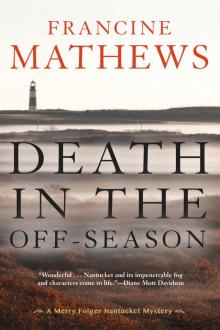 Death in the Off-Season
Death in the Off-Season Death in Rough Water
Death in Rough Water The Alibi Club
The Alibi Club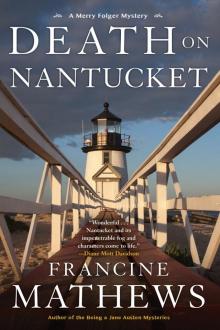 Death of a Wharf Rat
Death of a Wharf Rat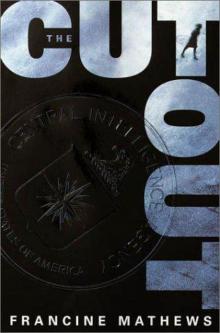 The Cutout
The Cutout The Secret Agent
The Secret Agent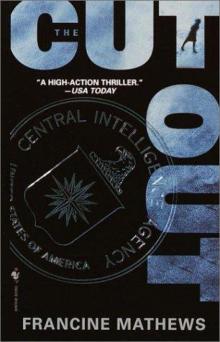 The Cutout cc-1
The Cutout cc-1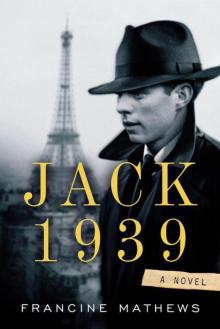 Jack 1939
Jack 1939 Death in a Cold Hard Light
Death in a Cold Hard Light Blown
Blown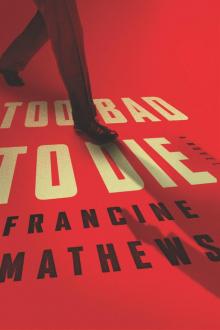 Too Bad to Die
Too Bad to Die